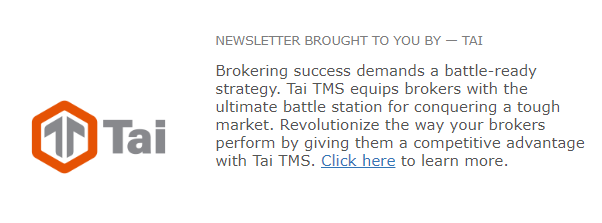[ad_1]

At the beginning of the year, one of my predictions for an area that companies would be focusing on was environmental, social and governance initiatives – turns out sustainability and reducing carbon emissions has made a splash.
Werner Enterprises has seen Vikram Mansharamani’s resignation from the company. Mansharamani, a member of the board of directors at Werner, attributed his resignation in part to Werner’s “unquestioned dedication to ESG considerations as a primary strategy.”
That’s a hot take in today’s landscape when more and more shippers, carriers and freight brokers are committing to ESG initiatives and are releasing their own carbon emissions data to the public.
According to the NTT 3PL study, “Among shippers, 59% indicated their organization had an ESG program with defined goals and objectives, and 51% indicated their supply chain had an ESG program with defined goals and objectives. Just under half of 3PL providers, 45%, said their organization had an established ESG program.”
The study also found that “76% of shippers and 80% of 3PLs agreed that the focus of shippers’ supply chains is mostly on the shipper organization itself and also on the most proximate supplier and customer organizations; 71% of shippers and 70% of 3PLs felt that the focus of supply chains is more ‘end-to-end’ and extends more deeply into supplier and customer networks.”
With all the progress that has been made on sustainability through the years, not being on board with that direction will not help a company maintain a competitive advantage. For those that are holding out and waiting to see if sustainability is actually worth it, just know it is. Shippers are wanting buy-in from partners, and those who aren’t coming up with a way to help and be a solution will struggle in the coming years.

TRAC Tuesday. This week’s TRAC Lane goes from Chicago to Kansas City, Missouri. The 500-mile trip through the finest corn fields of the Midwest is running about $2.54 per mile and unlikely to stray far from that rate as outbound tender rejections have fallen to 2.91%, a 73-basis-point decrease week over week. Kansas City also has seen a falloff of outbound tender rejections, which have dropped 210 basis points w/w. As long as rejection rates continue to fall and outbound tender volumes stay consistent, spot rates will remain relatively stable, making it a low-priority coverage lane.

Who’s with Whom? The latest Teamsters union battle seems to be over before it begins. This time it was between the Teamsters and Anheuser-Busch. Negotiations had stalled a few weeks ago, though both sides were still coming to the table. A strike was authorized to start last Friday, but that option is no longer needed as the two parties have reached an agreement.
The full breakdown of the deal wasn’t released but the highlights include “Wage increases of $8 an hour over the five years of the deal” and “A $4-per-hour raise kicks in immediately.” A $2,500 ratification bonus is included, too. The agreement still has to be ratified, but given that the dissident Teamsters for a Democratic Union – which often criticizes deals that the union reaches – isn’t on the attack, ratification is expected to pass with little dissent.
According to an article by FreightWaves’ John Kingston, “Anheuser-Busch said the deal ‘builds even further upon our existing industry-leading package of wages, healthcare, and retirement benefits, and it includes significant commitments to job security.’”
The more you know
Amazon rakes in $140 billion in annual fees from sellers, angering many with ‘crazy’ new fees
O’Reilly invests in larger distribution centers
Borderlands Mexico: Texas-based customs broker expands cross-border footprint
[ad_2]
Source link















